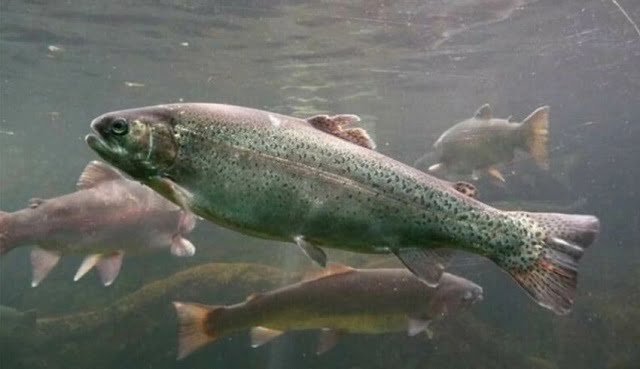
The burgeoning salmon industry faces a critical challenge: ensuring sustainable feed for the fish. Traditionally, fish oil (FO), rich in omega-3 fatty acids (FA), has been the preferred ingredient. However, heavily relying on wild fish for FO is not environmentally friendly.
Replacing FO with vegetable oils (VO) offers a more sustainable option. However VOs have a different FA profile and contain more omega-6 compared to omega-3. So, how does this change in the omega-3 to omega-6 ratio affect the salmon’s immune system?
A team of scientists from the Memorial University of Newfoundland (Canada) and Cargill Animal Nutrition and Health (USA) explored how the ratio of omega-6 to omega-3 polyunsaturated fatty acids (PUFAs) in low fish oil aquafeeds influences the antiviral and antibacterial immune responses of Atlantic salmon (Salmo salar).
- 1 Omega-3 and Omega-6: A balancing act for fish immunity
- 2 Proper balance: Omega-3 to omega-6 ratio is important
- 3 Unlocking new possibilities: Adapting diets for fish health
- 4 The study
- 5 Immune response under the microscope
- 6 Implications for the salmon industry
- 7 Conclusion
- 8 Entradas relacionadas:
Omega-3 and Omega-6: A balancing act for fish immunity
FAs play a crucial role in fish immunity. They are like building blocks of cell membranes and influence their response to immune challenges. Additionally, specific omega-3s like EPA and DHA act as anti-inflammatory agents, while omega-6s like ARA can promote inflammation.
While the health benefits of omega-3s for humans are well known, vegetable oils generally lack these long-chain omega-3s. Although vegetable oils can effectively boost fish growth, they can lead to lower levels of EPA and DHA in fish tissues. This change in FA profile can affect not only the marketability of farmed fish but also their immune function.
Proper balance: Omega-3 to omega-6 ratio is important
Research on how dietary FAs affect fish immunity has focused on replacing FO with vegetable oils (VO) in aquafeeds. However, the effects on immunity vary depending on the type of VO used. Vegetable oils come in various FA profiles, including omega-6, omega-3, monounsaturated, and saturated FAs. The specific VO chosen significantly affects the omega-3 to omega-6 ratio in the diet, which in turn influences the immune response.
Unlocking new possibilities: Adapting diets for fish health
Interestingly, some studies explored the impact of the omega-3 to omega-6 ratio without altering FO levels. Atlantic salmon fed with flaxseed oil (high in omega-3 ALA) showed improved immune gene expression compared to those fed with soybean oil (high in omega-6 LA). This suggests that beyond sustainability, replacing FO with vegetable oils can pave the way for developing new “clinical” aquafeeds that promote fish health.
The study
Omega-3 and omega-6 fatty acids are important, but maintaining a healthy balance is crucial. The study focused on how the ratio of these fatty acids in plant-based fish feed affects the salmon’s immune system. Two groups of salmon were fed diets:
- High in Omega-6: Rich in soybean oil, a common plant-based alternative.
- High in Omega-3: Rich in flaxseed oil, a plant oil higher in omega-3.
Immune response under the microscope
After 12 weeks on their respective diets, the salmon were exposed to simulated bacterial and viral infections. The researchers then analyzed the fish’s head kidneys, a key immune organ.
Stay Always Informed
Join our communities to instantly receive the most important news, reports, and analysis from the aquaculture industry.
The results were intriguing:
- Omega-3 advantage: Salmon fed a diet high in omega-3 (flaxseed oil) showed a more anti-inflammatory response. Their genes showed less activity associated with inflammation and neutrophil production (cells involved in the initial immune response).
- Enhanced antiviral potential: Interestingly, the omega-3 rich diet also promoted the expression of genes linked to the interferon pathway, a critical component of the antiviral immune response.
Implications for the salmon industry
This study sheds light on the potential of using vegetable oils with a balanced omega-3 to omega-6 ratio in fish feed. By optimizing this ratio, we can potentially:
- Boost fish immunity: Support a more robust immune system in farmed fish, potentially reducing the reliance on antibiotics and promoting overall fish health.
- Promote sustainability: Mitigate the dependence on limited fish oil resources, paving the way for a more sustainable aquaculture industry.
Conclusion
“This research highlights the ability of vegetable oils with different omega-6 and omega-3 PUFA ratios to modulate specific components of fish immune responses,” the scientists concluded.
Understanding how dietary FAs influence immune gene expression and tissue FA composition is crucial for developing sustainable aquafeeds that support the immune system for a healthy future in fish farming. It is also important to note that this research complements selective breeding of salmon to enhance fatty acid production.
The study was funded by the Government of Canada through Genome Canada and Genome Atlantic (Genomic Applications Partnership Program), and by Innovate NL and Atlantic Canada Opportunities Agency.
Contact
Albert Caballero-Solares
Department of Ocean Sciences, Memorial University of Newfoundland, St. John’s, NL, Canada
Email: acaballeroso@mun.ca
Reference (open access)
Eslamloo, K., Hall, J. R., Katan, T., Emam, M., Xue, X., Taylor, R. G., Balder, R., Parrish, C. C., & Rise, M. L. (2024). Vegetable omega-3 and omega-6 fatty acids differentially modulate the antiviral and antibacterial immune responses of Atlantic salmon. Scientific Reports, 14(1), 1-18. https://doi.org/10.1038/s41598-024-61144-w
Editor at the digital magazine AquaHoy. He holds a degree in Aquaculture Biology from the National University of Santa (UNS) and a Master’s degree in Science and Innovation Management from the Polytechnic University of Valencia, with postgraduate diplomas in Business Innovation and Innovation Management. He possesses extensive experience in the aquaculture and fisheries sector, having led the Fisheries Innovation Unit of the National Program for Innovation in Fisheries and Aquaculture (PNIPA). He has served as a senior consultant in technology watch, an innovation project formulator and advisor, and a lecturer at UNS. He is a member of the Peruvian College of Biologists and was recognized by the World Aquaculture Society (WAS) in 2016 for his contribution to aquaculture.







